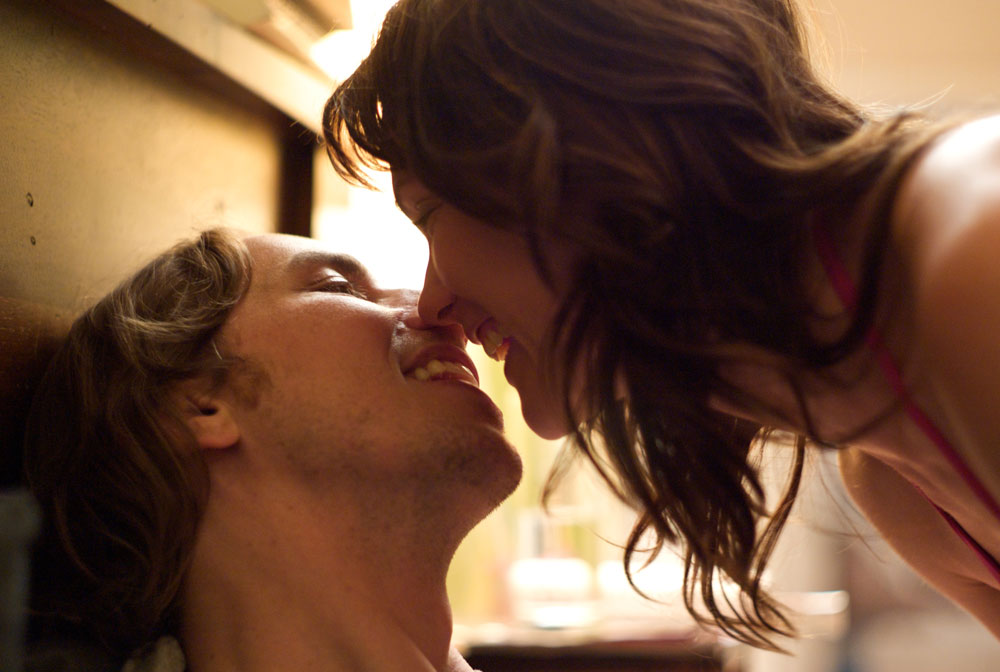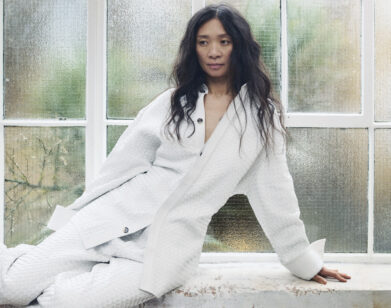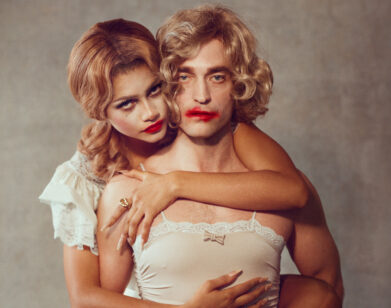Katie Aselton’s Freebie-Jeebies

KATIE ASELTON
If all you knew about the indie film The Freebie was its premise—a young Los Angeles couple decides to take a night off from their loving but stagnant marriage—and the fact that it stars Dax Shepard, you might get the wrong impression. A brainless sex romp, The Freebie is not. Rather, it’s an understated drama—at times wrenching, at times sweet—about love, complacency, trust, and how to handle the morning after.
It’s a simple story, but it manages to pack a lot into its 77 minutes—including the pleasant revelation that Dax Shepard is actually a very talented dramatic actor. Aselton is, too, and she also wrote and directed the film, which was shot in just 11 days in and around her own Silver Lake, Los Angeles home. We caught up with the multi-talent and discussed Shepard’s acting chops, the thirtysomething trap, and where the two characters might end up.
ALEXANDRIA SYMONDS: Where did the idea for The Freebie‘s premise come from?
KATIE ASELTON: The concept came from a very innocent conversation I was having with a friend. We were both in long-term, committed relationships, so we were talking about how awesome it was when we were single, and how great we had it. You didn’t have to talk everything to death, like you do when you are committed to making something work and last and you owe your partner your time. But there is something sort of fun about the idea of having one night where you don’t have to talk everything to death. That one thing you do give up when you get married is that magic moment of meeting someone, and the sparks and the spontaneity.
And so we were laughing about it, and how obviously that would never work because you end up sacrificing everything that you have. Or would you? And could it be better for your relationship? As I started to expand on that idea, I loved exploring this couple who thought that they were so evolved, that they were the couple that could handle that challenge, and then the idea that it would all blow up in their face because they weren’t nearly as evolved as they thought they were.
DAX SHEPARD AND KATIE ASELTON IN THE FREEBIE. PHOTO BY JOHN CHULDENKO, COURTESY OF PHASE 4
SYMONDS: Your character’s sister tries to warn her that it’s not a good idea, but Annie is so committed to the idea that she won’t listen to reason about it.
ASELTON: Exactly—they already said they were going to do it, they sort of have to follow through. And really, your voice of reason is saying it’s not going to work, but then there’s like the ego of competition, where you have to follow through with the challenge set before you.
SYMONDS: How did you go about casting Dax Shepard? It was such a surprise to see him in this role.
ASELTON: It was a surprise for me to see him in this role! Actually, we had another actor cast for a couple of months leading up to it, and then we shot a couple of days, and it just wasn’t working. It was a very particular style of shooting—it was all improvised—and he wasn’t enjoying himself, and we weren’t enjoying our experience with him. So we sort of severed the tie and I was like, “Oh my god, I just fired our lead actor.” Three days in. Holy shit. [laughs]
And so we looked at each other and went, what are we going to do? And someone threw out the name Dax Shepard, and my husband [director Mark Duplass] had met him recently and really enjoyed him. So Mark called him and said, “My wife is making this movie, are you interested?” And he said yes. I have no idea why he said yes, but he did, and I had known him mere hours before we started shooting the dinner party.
SYMONDS: Wow.
ASELTON: He just walked in and really blew us all away. I couldn’t have been more pleased with what he brought.
SYMONDS: Since you two seem so realistic as a couple—you have that sort of casual intimacy together that’s hard to fake—I had been wondering if you had done it like Blue Valentine, where Ryan Gosling and Michelle Williams lived together in a house for a month.
ASELTON: No, we didn’t! It’s a credit to his talent as an actor. I think part of what makes someone a great actor is being able to walk into a situation emotionally available and open, and have all your guards down, and just have that level of trust and security in yourself to know that you could walk out on that limb with someone else and be safe. And that’s what he did. And I, after shooting for the first couple hours, went into another room and just did a happy dance. I couldn’t believe how lucky I was.
SYMONDS: I’m bowled over to learn that you were basically strangers.
ASELTON: And it’s since been decided that we would like a studio to pick us up for a 12-picture deal.
SYMONDS: [laughs] You should! I would see them.
ASELTON: Where Annie and Darren go to a retirement home. [laughs]
SYMONDS: I wonder how a freebie in a retirement home would work. There would be fewer options.
ASELTON: I think it would be like Cocoon, only sexier. [laughs]
SYMONDS: The film’s narrative structure is interesting—it builds up to the conversation where they decide to have their respective one-night stands, and then it keeps flashing back to that conversation. Did you write the script that way, or did you write it chronologically and then manipulate it?
ASELTON: It’s all improvised, and we shot from an outline. There really is no stylistic part to the story—it’s a very straightforward story about these two people. There’s no subplot; there’s no B story; it’s just them, and you are watching them have this experience. So I thought an interesting way to make it more exciting for the audience would be to toy with the timeline a little bit, and look at the couple before and after, and see the small changes in the way that they’re affected.
So I color-blocked all my scenes—like before, during, and after the “freebie”—and I started just rearranging them and finding the most interesting ways that they could be laid out. I really like the way it turned out. We shot the whole movie chronologically, and then edited it in the same way that I did with the outline, where you take the scenes and play musical chairs with them to see what’s best. But my outline was a lot less linear than what we ended up with.
SYMONDS: When we’re cutting back and forth between Darren and Annie’s nights out, the viewer only has access to their experiences up to a certain point in their affairs—which is about the same for both of them, say, second base or so. When they argue later over whether they actually went through with it, the audience doesn’t know whether Darren is lying any more than Annie does, and vise-versa. Why did you decide not to show the viewer whether they went through with their freebies?
ASELTON: I [liked] the idea of putting the audience in their position and having to trust them and take them for their word—because truthfully, that is what the story is about. It’s not about whether or not they went through with it, it’s about the loss of the trust in their relationship. It doesn’t really matter whether they did it or not, because in the end, neither one of them believes the other one. The fact is that they got to that point.
SYMONDS: I do take heart from the idea that you’ve pictured Darren and Annie in a nursing home together, though—it gives me hope for the characters.
ASELTON: I know, I know. It works out for them…somewhere in movieland.
SYMONDS: You have such beautiful California locations in the film. From the outside, these people look like they’re in a Pottery Barn catalog, living the ideal thirtysomething life—but then there’s all this inner turmoil.
ASELTON: I do think there is something about your thirties that sort of creates that. By the time you are in your thirties, most of the time, you’ve got a job, you can pay for your rent, you can create this nice world around you. And still, you’re only in your thirties—you’re not that far away from your twenties, which is when you’re making all of your stupid mistakes. When you are just cresting the hill of such stupidity.
The house that Annie and Darren lived in was my house at the time, and we shot [everything] within a mile of that house. Silver Lake is kind of like that—all these aging hipsters settling in and being like, “You know what? Pottery Barn furniture is not so horrible. Oh, it’s reasonably priced and every now and again their line doesn’t look so awful.” And you do sort of fall into… it’s hipster suburbia?
SYMONDS: I didn’t want to use the “h” word, but yeah.
ASELTON: [laughs] Yeah. And I think that’s part of Darren and Annie’s problem, is that their life is settled. They lost the drama of their twenties, and they make money, and they can afford to live comfortably, and they’re married and it’s nice and they love each other. I think they maybe have hit a plateau.
SYMONDS: What do you have coming up?
ASELTON: Well, we just finishing airing season two of a television show I’m on called The League on FX, and we’re waiting with bated breath to see if we’ll get picked up for season three, which will be happening any day now, hopefully. I would love for that to happen, because it’s a super-fun show with really talented people. As far as the film world, what I am doing right now is developing another project for myself.
SYMONDS: Is there anything you can tell me about it?
ASELTON: I think that I’m going to go in a totally different direction and go into a thriller genre.
SYMONDS: Oh, wow.
ASELTON: I know, isn’t that crazy? I actually hate thrillers, they give me anxiety, but I like the idea of acting in one.
THE FREEBIE IS NOW AVAILABLE TO OWN ON DVD.






